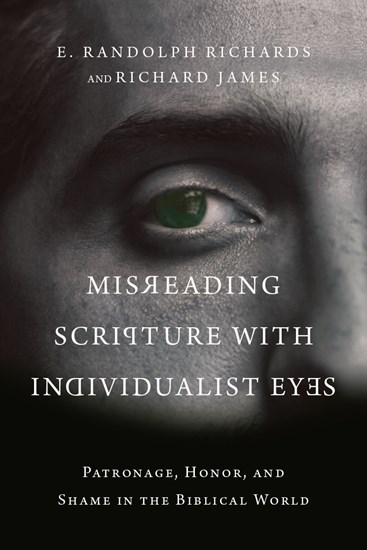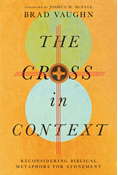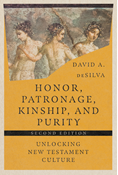
|
Misreading Scripture with Individualist Eyes
ebook
|
- Length: 304 pages
- Dimensions: 0 × 0 in
- Published: October 13, 2020
- Imprint: IVP Academic
- Item Code: 4379
- ISBN: 9780830843794
-
Other Retailers:
Amazon*
*affiliate partner
The Bible was written within collectivist cultures. When Westerners, immersed in individualism, read the Bible, it's easy to misinterpret important elements—or miss them altogether. In any culture, the most important things usually go without being said. So to read Scripture well we benefit when we uncover the unspoken social structures and values of its world. We need to recalibrate our vision.
Combining the expertise of a biblical scholar and a missionary practitioner, Misreading Scripture with Individualist Eyes is an essential guidebook to the cultural background of the Bible and how it should inform our reading. E. Randolph Richards and Richard James explore deep social structures of the ancient Mediterranean—kinship, patronage, and brokerage—along with their key social tools—honor, shame, and boundaries—that the biblical authors lived in and lie below the surface of each text. From Abraham, Sarah, and Hagar to Peter's instructions to elders, the authors strip away individualist assumptions and bring the world of the biblical writers to life.
Expanding on the popular Misreading Scripture with Western Eyes, this book makes clear how understanding collectivism will help us better understand the Bible, which in turn will help us live more faithfully in an increasingly globalized world.
"Do we really misread Scripture with individualist eyes? Richards and James put that question to rest . . . yes, we do! If collectivist thinking has ever seemed too complex or even unbiblical, this book can bring clarity. It is not only practical, it's a page-turner. Its scriptural insights are gems and its stories illuminating. They demonstrate the significance of collectivist thinking both in the Bible and our contemporary world, making it a vital resource for missionaries, theologians, and biblical scholars. At the same time, the book's down-to-earth style will make it popular for a broader audience."
"What an illuminating book! Richards and James take us on a delightful journey through the biblical world of collectivistic culture. They make concepts like kinship, honor and shame, patronage, and brokerage come to life by illustrating them richly from both Scripture and their own life experiences. Their fresh readings of biblical stories alone are worth the price of the book. But Western Christians also should prepare to be unsettled. The authors expose how often our individualistic readings of texts lead us to miss the point. Beautifully written and highly accessible, the book not only shows how Scripture reflects collective values but also how the gospel reshapes and redeems those values. Please read this book. Be challenged by it. You may never read the Bible the same way again!"
"Like seasoned travelers to a foreign land, Randy and Rich help us understand the culture of the biblical world as they take us on a trip through the Scriptures. Since we are Westerners born and bred in a world that celebrates our individualism, it doesn't take long for us to realize that the people of the Bible don't think like us, act like us, share our social convictions, or claim the same worldview. That's when our expert tour guides step up to answer the question, 'Why do they do that?,' keeping us from misreading Scripture with individualist eyes."
"The best biblical studies address two horizons at once: behind the text and in front of the text. This book does exactly that. It deals seriously with a constellation of complex cultural dynamics from the biblical world in a way that invites readers to reflect on their own cultural assumptions. The result is a fresh engagement with familiar texts and profound implications for a range of topics from soteriology to discipleship."
"Richards and James are master storytellers who bring to life the world of the Bible. By explaining the implicit cultural backdrop to biblical stories, the authors paint a rainbow of color on the black and white pages of Scripture. Misreading Scripture with Individualist Eyes draws on decades of international experience living in non-Western cultures and on vast biblical knowledge. Readers gain a deep and clear understanding of the Bible's stories and characters, plus a rich appreciation for the global church today. Profound insights and fun to read¬—this book delights the heart and mind!"
"Without bashing modern scholarship or Western individualism, Richards and James show us the major benefits of reading Scripture from a collectivist cultural model, a model much closer to the original readers and writers of the Bible. What they make abundantly clear in every example and illustration is that we (individualists) take so much for granted and miss so much in the process. Entertaining. Enlightening. Inspired."
"Everyone reads the Bible through their own cultural framework. It just so happens that Westerners do so through an individualist one, which is foreign to the collectivist worldview of the biblical authors. Richards and James argue winsomely that understanding social values such as patronage, honor, and shame will make us better readers of the Bible. Their book should be on every hermeneutics reading list!"
CONTENTS
Preface
Introduction
Part 1. Social Structures of the Biblical World
1. Kinship: Being in a Family
2. Kinship: Staying in a Family
3. Patronage: Gifts Had Strings Attached
4. Patronage: The System and the Players
5. Patronage: Grace, Faith, and the Language of Patronage
6. Brokerage in the Biblical World
Part 2. Social Tools: Enforcing and Reinforcing Our Values
7. Having Honor: Everybody Has Some
8. Gaining Honor: Everybody Wants More
9. Honor Contests
10. Having Shame: It Is Good for Everyone
11. Shaming: Done Right (and Wrong)
12. Having Boundaries: Us and Them
13. Guarding Boundaries: Keeping Us Us
Part 3. Why Does Collectivism Really Matter to Me?
14. Redeeming Kinship and Boundaries: Who Is Our Family?
15. Redeeming Patronage and Brokerage
Conclusion: Biblical Collectivism in My Individualist World
Author Index
Subject Index
Scripture Index













